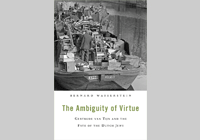
SCAS News - 14 October, 2014
New Book by Former SCAS Fellow Bernard Wasserstein
The recently published book The Ambiguity of Virtue: Gertrude van Tijn and the Fate of the Dutch
Jews
(Harvard University Press, 2014) was written by Bernard Wasserstein as he was a Fellow in
residence at
the Collegium during the academic year 2011-12.
Bernard Wasserstein is Harriet & Ulrich E. Meyer Professor Emeritus of Modern European Jewish
History
at the University of Chicago. His research interests are in the history and politics of Israel,
modern Jewish
history, and, more generally, in twentieth-century international history. Previous books
include The British
in Palestine (1978),
Britain and the Jews of Europe: 1939-1945 (1979), The Secret
Lives of Trebitsch Lincoln
(1988), Herbert Samuel (1992), Vanishing Diaspora (1996), Secret War in
Shanghai (1999), Divided Jerusalem
(2001), Israel and Palestine (2003), Barbarism and Civilization:
A History of Europe in Our Time (2008), and
On the Eve: The Jews of Europe before the Second World
War (2012). The latter one, On the Eve: The Jews of Europe before the Second World
War, was finalized
during Wasserstein’s time at SCAS.
ABOUT THE BOOK:
In May 1941, Gertrude van Tijn arrived in Lisbon on a mission of mercy from German-occupied
Amsterdam. She came with Nazi approval to the capital of neutral Portugal to negotiate the departure
from Hitler’s Europe of thousands of German and Dutch Jews. Was this middle-aged Jewish woman,
burdened with such a terrible responsibility, merely a pawn of the Nazis, or was her journey a genuine
opportunity to save large numbers of Jews from the gas chambers? In such impossible circumstances,
what is just action, and what is complicity?
A moving account of courage and of all-too-human failings in the face of extraordinary moral challenges,
The Ambiguity of Virtue tells the story of Van Tijn’s work on behalf of her fellow Jews as the avenues
that might save them were closed off. Between 1933 and 1940 Van Tijn helped organize Jewish emigration
from Germany. After the Germans occupied Holland, she worked for the Nazi‐appointed Jewish Council in
Amsterdam and enabled many Jews to escape. Some later called her a heroine for the choices she made;
others denounced her as a collaborator.
Bernard Wasserstein’s haunting narrative draws readers into the twilight world of wartime Europe, to expose
the wrenching dilemmas that confronted Jews under Nazi occupation. Gertrude van Tijn’s experience raises
crucial questions about German policy toward the Jews, about the role of the Jewish Council, and about Dutch,
American, and British responses to the persecution and mass murder of Jews on an unimaginable scale.






